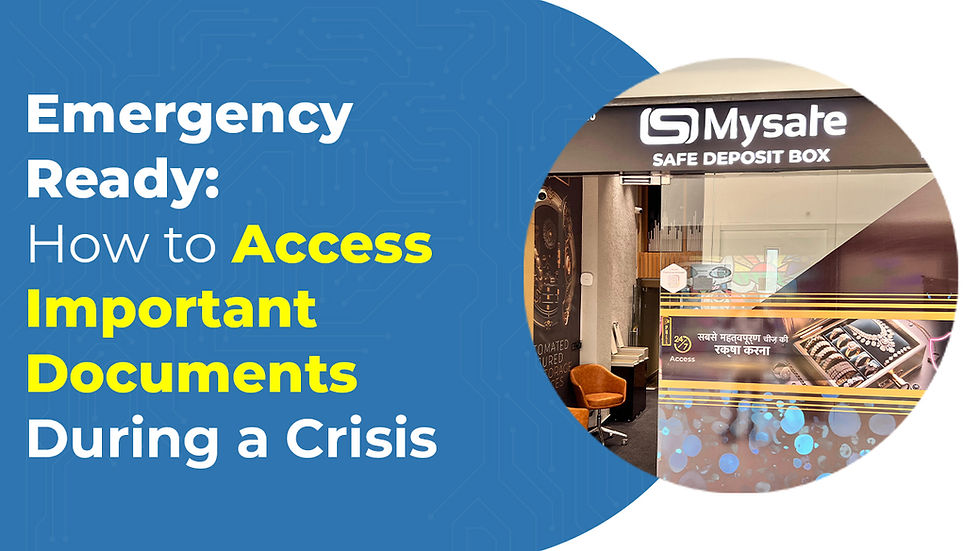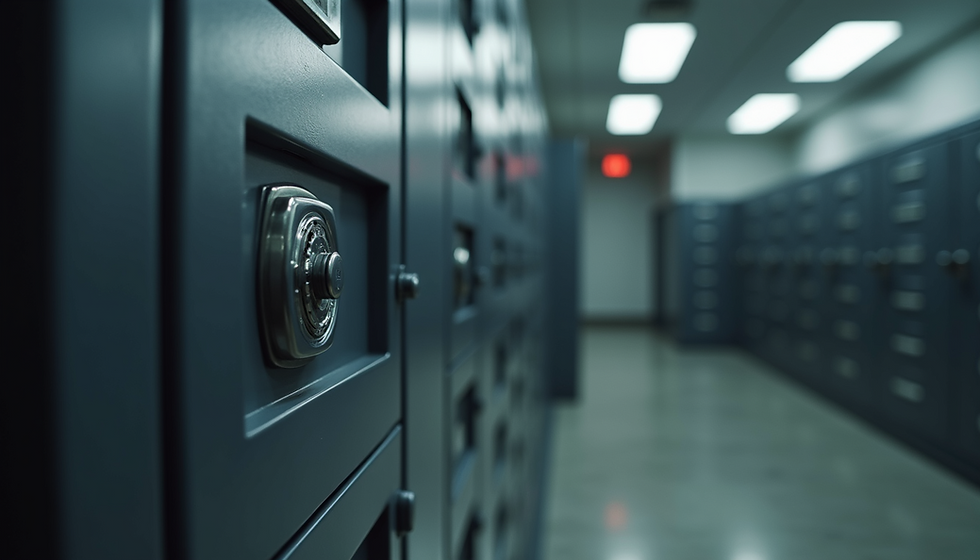Emergency Ready: How to Access Important Documents in a Crisis
- Brandhype India
- Jul 21
- 4 min read
Imagine this. It's the dead of night. A flood warning flashes on your phone, and you've only minutes to evacuate your home. In the panic, you grab clothes, medications, and household members, but what about your will, your insurance policies, your ID cards? During the confusion of an actual emergency, it's usually these important documents that are left behind, making recovery a distant dream.
All over India, families are increasingly coming to realise that they need smart preparedness. The sort that keeps both your people and your papers safe.

India's Reality: Emergencies Are No Longer Rare
India has seen its share of crises. From the catastrophic floods in Assam to mass-scale cyberattacks on public institutions, emergencies are becoming more common and more volatile.
According to the EM-DAT International Disaster Database, more than 26,000 mass disasters have taken place across the globe since the year 1900. India is always one of the most affected nations. During 2025, Operation Abhyaas, a civil defence simulation exercise involving 244 districts and activating thousands of emergency response teams, was initiated by the government. It was a big move, revealing just how earnestly the country is starting to take disaster preparedness.
But natural disasters are not the only thing we have to fear. In the cyber world, India has seen 1.32 million cybersecurity incidents between January and October 2023 alone. To give you a better idea, in 2017, that number was just 53,117.
In 2018, the notorious Aadhaar leak laid bare the private data of 1.1 billion citizens, including bank and biometric information. Earlier this year, a data breach at the Indian Council of Medical Research in 2023 impacted 815 million people, exposing sensitive health and passport data.
These are facts that speak for themselves. Emergencies today are physical and cyber. And no matter whether it's a document submerged in floodwater or hacked online, the outcome is the same: you can't get what you need when you most need it.
Why Instant Access to Documents Matters
Emergencies usually require identification, proof of address, insurance claims, and medical history instantly. But too many people find themselves ill-prepared.
In Operation Abhyaas, ID and address proof were needed in order to navigate checkpoints or access assistance. Without access to essential documents, survivors were bogged down by bureaucracy at the very moment they required help.
Inability to access documents in a crisis situation can result in:
Delayed or refused insurance claims
Difficulty in accessing emergency medical care
Difficulty establishing home or land ownership
Barriers in accessing government relief
No one family would like to encounter such matters when they are already suffering from trauma. That is why the proper type of storage and access can truly make a difference.
How to Remain Emergency Prepared: 4 Steps That Really Work
1. Keep Originals in a Safe Deposit Box
Think of a safe deposit box as your first line of defence. Many people rely on home safes, but they often fail in the face of fire, floods, or burglary. A professionally maintained safe deposit box, whether through a bank or a private provider, is specifically built to withstand those risks.
These modern storage solutions provide:
Fire and flood-resistant vaults
Biometric entry and round-the-clock CCTV
Insurance options and audit trails
Fast and flexible access during emergencies
India has only 6.3 million bank lockers today, and only 10% of Indian households are equipped with access to them. But with demand projected to swell to 60 million by 2030, private locker facilities are quickly filling the gap. They tend to be more convenient and accessible than banks, with online sign-ups, longer hours, and clear pricing.
When the worst happens, a safe deposit box can mean the difference between rebuilding and resuming where you were.
2. Digitally Back Up Documents, But Carefully
A hard copy is necessary, but a digital backup provides an added measure of security. But since cybersecurity is what it is, care must be taken when doing this.
Practice these best practices:
Hold copies on reputable cloud services that use end-to-end encryption
Secure accounts with good passwords and two-factor authentication
Have a digital inventory list in a safe note or spreadsheet
Regularly test your access to prevent login problems in times of crisis
Remember, digital backups are only useful if they are secure and retrievable.
3. Get an Emergency Document Kit at Home
You should have a small, physical emergency kit too. Keep certified copies of vital documents like:
Aadhaar and PAN cards
Property documents
Health insurance and life insurance policies
Records of key medical information
Pages from passport and recent passport photos
Keep this kit stored in a fireproof and waterproof container in the vicinity of your exit point at home. It should be accessible in seconds.
4. Establish Nominee and Family Access Procedures
During a crisis, you may not be the one reaching your papers. Ensure a responsible family member or nominee is aware of where your safe deposit box is located, how to retrieve computer backups, and what to do if you are not around.
Review these access plans annually or after significant life events like marriage, moving, or retirement.
Government Efforts: Strong But Not Enough on Their Own
Emergency preparedness is being heavily invested in by the Indian government. Digital systems handled records and relief for more than 1.4 billion during the COVID-19 pandemic. The National Database for Emergency Management now provides geo-tagged information to support disaster relief.
But these systems rely on the correctness of public data and the person's capability to access them. Amidst the mess of actual events, personal preparedness oftentimes is the deciding factor.
Conclusion
Emergencies do not come with notice. Be it a flash flood, a breached database, or a medical emergency, the only actual defence is preparation.
A safe deposit box provides strong physical protection. Digital backups are convenient. A family access plan allows you control even when away. And an emergency kit in your home allows you to stay mobile when time is of the essence.
Take the steps now. Because peace of mind isn't only about avoiding disaster, it is about being prepared for it.




Comments